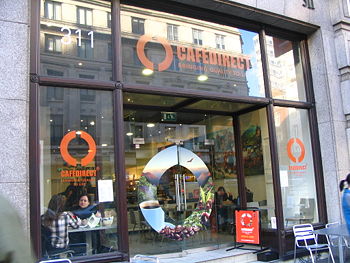
Alternative trading organization
Encyclopedia
An alternative trading organization (ATO) is usually a non-governmental organization
(NGO) or mission-driven business aligned with the Fair trade
movement, aiming "to contribute to the alleviation of poverty in developing regions of the world by establishing a system of trade that allows marginalized producers in developing regions to gain access to developed markets".
Alternative trading organizations have Fair Trade at the core of their mission and activities, using it as a development tool to support disadvantaged producers and to reduce poverty, and combine their marketing with awareness-raising and campaigning.
Alternative trading organizations are often, but not always, based in political and religious groups, though their secular purpose precludes sectarian identification and evangelical activity. Philosophically, the grassroots political-action agenda of these organizations associates them with progressive political causes active since the 1960s: foremost, a belief in collective action
and commitment to moral principles based on social, economic and trade justice
.
Historically, the largest and most influential ATOs include:
 The defining characteristic of alternative trading organizations is that of equal partnership and respect - partnership between the developing region producers and importers, shops, labelling organizations, and consumers. Alternative trade "humanizes" the trade process - making the producer-consumer chain as short as possible so that consumers become aware of the culture, identity, and conditions in which producers live. All actors are committed to the principle of alternative trade, the need for advocacy in their working relations and the importance of awareness-raising and advocacy work. The idea of the "invisible hand
The defining characteristic of alternative trading organizations is that of equal partnership and respect - partnership between the developing region producers and importers, shops, labelling organizations, and consumers. Alternative trade "humanizes" the trade process - making the producer-consumer chain as short as possible so that consumers become aware of the culture, identity, and conditions in which producers live. All actors are committed to the principle of alternative trade, the need for advocacy in their working relations and the importance of awareness-raising and advocacy work. The idea of the "invisible hand
" has given way to the idea of working "hand in hand" with the market regulated by democratic authorities.
Alternative Trading Organizations generally support the following Fair Trade principles and practices in trading relationships:
Creating opportunities for economically disadvantaged producers
Transparency and accountability
Capacity building
Payment of a fair price
Gender equity
Working conditions
Environment
Non-governmental organization
A non-governmental organization is a legally constituted organization created by natural or legal persons that operates independently from any government. The term originated from the United Nations , and is normally used to refer to organizations that do not form part of the government and are...
(NGO) or mission-driven business aligned with the Fair trade
Fair trade
Fair trade is an organized social movement and market-based approach that aims to help producers in developing countries make better trading conditions and promote sustainability. The movement advocates the payment of a higher price to producers as well as higher social and environmental standards...
movement, aiming "to contribute to the alleviation of poverty in developing regions of the world by establishing a system of trade that allows marginalized producers in developing regions to gain access to developed markets".
Alternative trading organizations have Fair Trade at the core of their mission and activities, using it as a development tool to support disadvantaged producers and to reduce poverty, and combine their marketing with awareness-raising and campaigning.
Alternative trading organizations are often, but not always, based in political and religious groups, though their secular purpose precludes sectarian identification and evangelical activity. Philosophically, the grassroots political-action agenda of these organizations associates them with progressive political causes active since the 1960s: foremost, a belief in collective action
Collective action
Collective action is the pursuit of a goal or set of goals by more than one person. It is a term which has formulations and theories in many areas of the social sciences.-In sociology:...
and commitment to moral principles based on social, economic and trade justice
Trade justice
Trade justice is a campaign by non-governmental organisations lobbying for changes to the rules and practices of world trade so that poor people and the environment benefit...
.
Historically, the largest and most influential ATOs include:
Principles and practices

Invisible hand
In economics, invisible hand or invisible hand of the market is the term economists use to describe the self-regulating nature of the marketplace. This is a metaphor first coined by the economist Adam Smith...
" has given way to the idea of working "hand in hand" with the market regulated by democratic authorities.
Alternative Trading Organizations generally support the following Fair Trade principles and practices in trading relationships:
Creating opportunities for economically disadvantaged producers
- Fair trade is a strategy for povertyPovertyPoverty is the lack of a certain amount of material possessions or money. Absolute poverty or destitution is inability to afford basic human needs, which commonly includes clean and fresh water, nutrition, health care, education, clothing and shelter. About 1.7 billion people are estimated to live...
alleviation and sustainable developmentSustainable developmentSustainable development is a pattern of resource use, that aims to meet human needs while preserving the environment so that these needs can be met not only in the present, but also for generations to come...
. Its purpose is to create opportunities for producers who have been economically disadvantaged or marginalized by the conventional trading system.
Transparency and accountability
- Fair trade involves transparent management and commercial relations to deal fairly and respectfully with trading partners.
Capacity building
- Fair trade is a means to develop producers’ independence. Fairtrade relationships provide continuity, during which producers and their marketing organizations can improve their management skills and their access to new markets.
Payment of a fair price
- A fair price in the regional or local context is one that has been agreed through dialogue and participation. It covers not only the costs of production but enables production which is socially just and environmentally sound. It provides fair pay to the producers and takes into account the principle of equal pay for equal work by women and men. Fairtraders ensure prompt payment to their partners and, whenever possible, help producers with access to pre-harvest or pre-production financing.
Gender equity
Gender equality
Gender equality is the goal of the equality of the genders, stemming from a belief in the injustice of myriad forms of gender inequality.- Concept :...
- Fair trade means that women’s work is properly valued and rewarded. Women are always paid for their contribution to the production process and are empowered in their organizations.
Working conditions
- Fair trade means a safe and healthy working environment for producers. The participation of children (if any) does not adversely affect their well-being, security, educational requirements and need for play and conforms to the UN Convention on the Rights of the Child as well as the law and norms in the local context.
Environment
- Fair trade actively encourages better environmental practices and the application of responsible methods of production.

